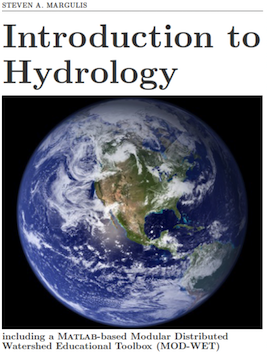Teaching
Freely-available “Introduction to Hydrology” Textbook

Over the last several years we have developed a freely-distributed electronic textbook for use in introductory hydrology courses. It is currently used as the required textbook for the “C&EE 150: Introduction to Hydrology” undergraduate course at UCLA. The textbook provides a broad foundation in the topics of hydrologic science including: mass balance, basic atmospheric thermodynamics, radiation, atmospheric circulation, precipitation, snow, evapotranspiration, unsaturated flow and infiltration, groundwater, and runoff. The book is available in iBooks and PDF format and leverages many embedded multimedia resources to aid in conceptual understanding of the topics. An emphasis is placed on real problem solving including numerical applications.
As such, a “Modular Distributed Watershed Educational Toolbox (MOD-WET)” of MATLAB functions is integrated into the book. The individual MOD-WET functions build up to a fully-distributed watershed model that is described in the final chapter. The fully-coupled MOD-WET model provides a basis for integrating the set of concepts covered in the class in the context of both qualitative and quantitative demonstrations and experiments using the study watershed as a virtual laboratory. The book is optimized for use within iBooks (i.e. on an iPad or iBooks reader) to take full advantage of multimedia, but a PDF version is also provided (with embedded movies that play when using Adobe Reader) for those who would prefer that format.
The book was first offered in 2014. It is currently on its fourth major edition. Below we provide links to the new 2017a version (posted on 08/18/2017). The new edition primarily differs from the 2016 edition in fixing typos and adding clarification. The MOD-WET code continues to be updated with the newest edition being 2019a.
To download the textbook and/or the MOD-WET software, please fill out the form by clicking here.
For instructors:
Solutions for problems in the textbook are available upon request.
Contact info:
Steve Margulis (margulis@seas.ucla.edu)
Errata/Omissions (for 2017a Textbook Edition and/or 2019a MOD-WET Edition):
A running tabulation of errors (typographical or otherwise) will be kept here along with any MOD-WET modifications until the next edition is created.
- September 23, 2019: The 2019a edition of MOD-WET has been uploaded to replace the 2017a edition with all known bugs fixed. There are no new code bugs to report as of yet.